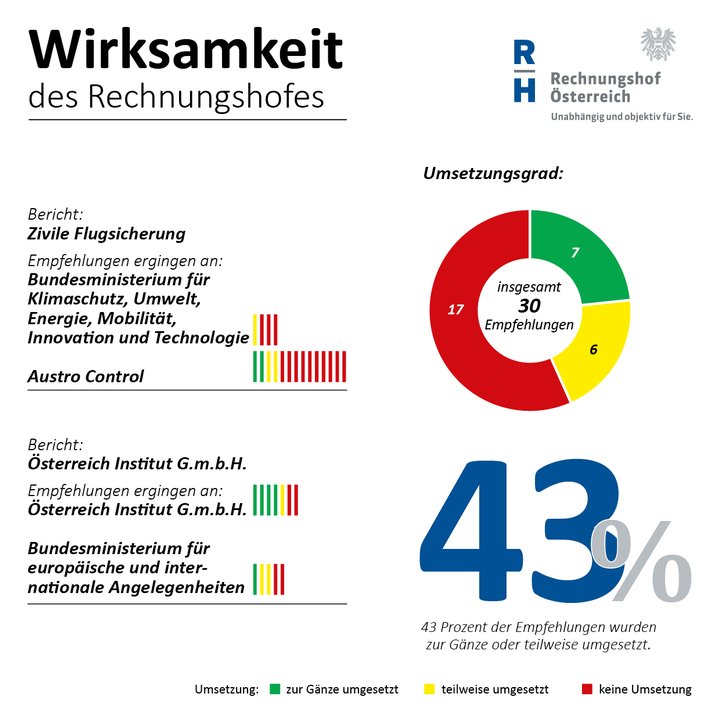Austro Control’s staff expenditure increased massively in the years from 2015 through 2018

Today, the Austrian Court of Audit (ACA) presented two follow-up audits: "Civil Air Traffic Control" and "Österreich Institut G.m.b.H.".
Of the overall 18 recommendations issued in the ACA’s preceding report “Civil Air Traffic Control”, 13 were not implemented at all, three partly and only two fully. The recommendations had been addressed to Austro Control as well as to the renamed Federal Ministry for Climate Action, Environment, Energy, Mobility, Innovation and Technology.
The considerable staff expenditure of Austro Control was a central issue of the ACA’s preceding report. Therein, the ACA recommended to mitigate the expenditure and to ensure an increase in productivity and efficiency, such as in the areas of air traffic control, training and meteorological services.
According to Austro Control, the management had invited the competent trade unions via a letter from 18 May 2020 to enter into collective agreement negotiations. In this letter, the management had clearly stated that Austro Control aimed at achieving the necessary reduction of expenditure also via cuts to the applicable collective agreements. First talks with the trade unions had been scheduled for end-June 2020. In a communication of 26 November 2020, Austro Control declared to have attained savings of about EUR 50 million in its negotiations with the employee representatives.
Staff expenditure increased massively
As unveiled by the ACA’s report, staff expenditure rose from EUR 150.63 million in 2015 to EUR 224.63 million in 2018. This corresponds to an increase of about 49 per cent, of which a considerable part represented old-age pensions. However, even with old-age pensions excluded, staff expenditure increased by some 12 per cent from EUR 140.99 million to EUR 158.31 million in the same period. The number of staff members, however, only rose by some 4 per cent.
Austro Control had two collective agreements (CA). CA 1 applied to staff members who had joined the company by end-1996. After that, CA 2 came into effect. Contrary to the ACA’s recommendation, Austro Control failed to render the remuneration schemes of the two collective agreements comparable with the Federal Government. The company paid, for example, a remuneration of some EUR 12,500 per month for a head of department, while the Federation paid just under EUR 8,500. At the time of the audit from 2016 to 2019, no progress had been achieved with regard to the envisaged introduction of a CV 3, whose first draft has been existing since 2016.
Mitigating expenditure
The ACA reiterates its recommendation issued to Austro Control to follow, with the help of the ministry, the general government's pension reform process by the adoption of cost-mitigating measures in CA 1 and to ensure, on the medium term, an intergenerationally equitable and sustainable redesign of the pension entitlements of Austro Control’s employees. Severance payment entitlements in CA 1, for example, are to be reduced gradually from 20 months to the statutory 12 months. The ACA recommends to the ministry to render its provisions to mitigate Austro Control’s staff expenditure more concrete.
The follow-up audit was carried out prior to the outbreak of the COVID-19 pandemic and the related massive decline in traffic in the Austrian airspace.
Follow-up audit of the Österreich Institut G.m.b.H.
The follow-up audit of the “Österreich Institut G.m.b.H.” showed that the recommendation to establish a budget plan, in coordination with the Federal Ministry for European and International Affairs, for the planning of self-financing remained unheeded.
Furthermore, the Österreich Institut G.m.b.H. failed to implement the recommendation to document the remuneration of managers in the financial statements, subject to the consent of the affected persons, in a transparent manner. Strategic decisions made by the competent ministry with regard to the future development of the Österreich Institut G.m.b.H. were not documented clearly. Of twelve recommendations, five were implemented fully, three partly and four not at all.
- pdf Datei:
- 1,487.4 KB
- Umfang:
- 60 Seiten
Report: Civil Air Traffic Control; Follow-up Audit (in German)
- pdf Datei:
- 965.6 KB
- Umfang:
- 40 Seiten


